SH2602 Transmutation of Nuclear Waste 8.0 credits
This course has been discontinued.
Decision to discontinue this course:
No information inserted
Information per course offering
Course offerings are missing for current or upcoming semesters.
Course syllabus as PDF
Please note: all information from the Course syllabus is available on this page in an accessible format.
Course syllabus SH2602 (Autumn 2007–)Content and learning outcomes
Course contents
Intended learning outcomes
The generation of radio-toxic nuclear waste is considered by the public to be one of the major drawbacks related to the use of nuclear power. Recycling of the waste in nuclear reactors may reduce the dimension of this problem considerably. After the course you will be able to make design choices that makes waste transmutation safe and reasonably economic. This objective is achieved if you show that you are able to
- assess nuclear and thermal hydraulic aspects of reactor safety when introducing plutonium, americium and curium into the fuel,
- select chemical forms for the fuel that provide acceptable compromises between high temperature stability, reprocessability and transmutation performance,
- select structural materials that combine irradiation and corrosion resistance with good mechanical properties.
Passing the course typically means that you have attended 30 hours of meetings, and performed 170 hours of work in your office. Most effort is thus to be done out of class.
Literature and preparations
Specific prerequisites
Recommended prerequisites: You have to be able to apply basic knowledge about nuclear and reactor physics before the first meeting. A suitable background is e.g. the KTH course in reactor physics (SH2600).
Literature
- Transmutation of nuclear waste, J. Wallenius, 2006 (PDF-files).
- Computer code manuals
- Collection of scientific articles
Examination and completion
Grading scale
Examination
- PRO2 - Transmutation in a Fast Neutron Spectrum, 1.0 credits, grading scale: P, F
- PRO1 - Multirecycling of Plutonium in PWRs, 1.0 credits, grading scale: P, F
- PRO4 - Coolant and Clad Temperatures, 1.0 credits, grading scale: P, F
- PRO3 - Transmutation in Accelerator Driven Systems, 1.0 credits, grading scale: P, F
- TEN1 - Interview about Conference Paper, 2.0 credits, grading scale: P, F
- PRO5 - Writing of Conference Paper, 2.0 credits, grading scale: P, F
Based on recommendation from KTH’s coordinator for disabilities, the examiner will decide how to adapt an examination for students with documented disability.
The examiner may apply another examination format when re-examining individual students.
If the course is discontinued, students may request to be examined during the following two academic years.
Other requirements for final grade
To pass the course you should actively participate in all course meetings. With exception of the first meeting, the result of home assignments will be presented and discussed. If you cannot attend a meeting, report this in advance, and you will be given an extra written assignment to replace the meeting you missed.
You are further required to have participated in writing and presenting a conference paper with the title "Performance and safety of waste transmutation in a reactor of type A with coolant B and fuel C". The research for the paper will be done in groups. The paper is to be presented orally at one of the course meetings. The final examination constitutes of an individual discussion with the teacher about the contents of the paper, lasting 30-60 minutes.
Examiner
Ethical approach
- All members of a group are responsible for the group's work.
- In any assessment, every student shall honestly disclose any help received and sources used.
- In an oral assessment, every student shall be able to present and answer questions about the entire assignment and solution.